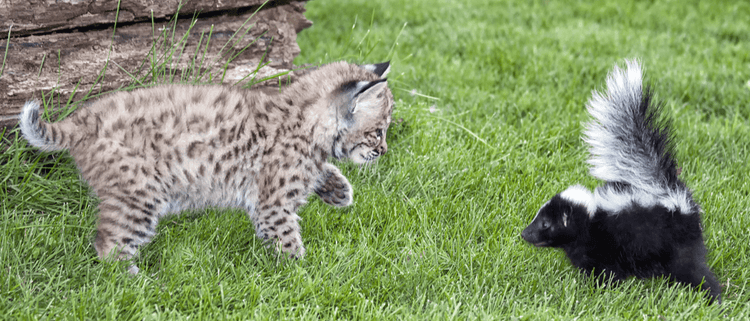
How to Get Rid of Skunk Odor on Cats and Dogs
The distinct smell of a skunk is something every pet owner dreads. Thankfully, knowing more about skunks and their behavior can help you prevent your pet from falling victim to the infamous “eau de skunk.” If your pet does get into an altercation with a skunk, we have some steps you can take to eliminate that odor and to ensure your pet does not suffer from any other unwanted side effects.
Skunks And Their Spray
Skunks are typically docile animals and tend to be uninterested in confrontation. If a skunk does encounter a predator, it will do its best to warn the predator not to come closer through actions such as hissing and stomping. However, if the predator doesn’t get the message, the skunk will take aim and fire its infamous spray. It is very unfortunate for us, as pet owners, when the predator isn’t a wild animal, but our beloved dog or cat.
Skunk spray comes from the anal gland sacs, which are small, liquid-filled pouches located at 5 o’clock and 7 o’clock just inside of the anus. A skunk has the ability to shoot this spray up to 15 feet away, so the likelihood of a predator or an unassuming pet getting hit is rather high. The spray is also an oil, meaning it mixes poorly with water and clings to the surfaces it lands upon, most notably the skin. The chemicals that make up the spray are the volatile compounds thioacetate and thiol. Volatile means that the compounds can readily become a gas, which is why the smell is so potent. Thioacetates tend to be less potent than thiols, but when they mix with water, they are converted to thiols. That is why many recently skunked pets smell worse after they get wet.
How to Stop Your Pet from Getting Sprayed
Skunks tend to be most active during warmer months, and they like to create dwellings in places such as tree stumps, wood piles, caves, or abandoned buildings and crawl spaces. They tend to be more active during dawn and dusk hours. They are opportunistic carnivores, meaning that they eat a wide variety of food.
Thankfully, there are measures you can take to help reduce the chances of your pet coming in contact with a skunk and getting sprayed:
- Trash bins and other waste receptacles should be kept locked up, reducing access to skunks and other animals, such as racoons.
- Reduce the areas where skunks can create dens. You should lock up sheds, board up crawl spaces and decks, and remove any lingering wood piles.
- Avoid letting dogs off leash and try to keep them close by at dawn and dusk.
What to Do If Your Pet Falls Victim
Pets often get sprayed on the face and head. If they inadvertently ingest the spray, this may lead to nausea and vomiting. Spray entering the eyes can also lead to irritation, discomfort, and corneal (eye surface) damage. If you feel your pet is suffering from either of these side effects, you should contact your veterinarian for further direction.
If you and your pet are merely suffering from the foul odor, we have a solution:
- Keep your pet outside in a confined area to prevent the smell from entering your house.
- While old information points to tomato juice and vinegar as remedies, we now know that these are ineffective. Instead, you can use some common household ingredients to make your own odor killer. Alternatively, you can purchase commercial odor eliminators from your local pet store.
- At-Home Remedy:
- 1 quart of 3% Hydrogen Peroxide
- ¼ cup of baking soda
- 1 – 2 tsp of liquid dishwashing soap
- This product should be made when you are ready to use it and should not be stored, as it can explode in a closed container and also lose its effectiveness. You can double or triple the recipe for larger dogs.
- At-Home Remedy:
- Using gloves, begin massaging the product into your pet’s haircoat.
- Allow it to sit for 5 – 20 minutes prior to rinsing, but don’t allow it to sit much longer as it can result in bleaching of the fur. Please note: the eyes should be avoided.
- Rinse your pet completely with water and then repeat the process as necessary until you achieve elimination of the odor.
- Afterwards, you can use a regular dog or cat shampoo to completely bathe your pet.
Things to Keep in Mind If Your Pet Gets Sprayed by a Skunk
Don’t forget to re-apply any topical medications, such as flea and tick preventative, 24 – 48 hours after bathing.
If this seems like a large feat for you, you can contact a groomer to help, although it should be noted that not all groomers will take on a skunked pet.
Also, keep in mind that skunks can carry rabies. Therefore, if your pet comes in close contact with a skunk, your veterinarian should be contacted regarding any other steps that may need to be taken.